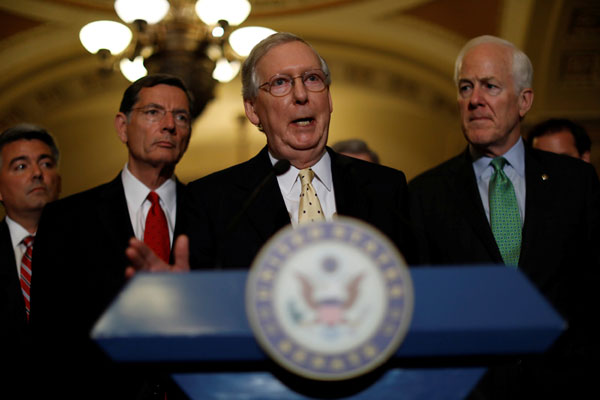US Senate aims for a 'skinny' Obamacare repeal as other options fail
The last-ditch effort came after senators voted 55-45 against a straight repeal of Obamacare, which would have provided for a two-year delay in implementation to give Congress time to work out a replacement. Seven Republicans opposed the measure.
It was the Senate's second failure in 24 hours to repeal the 2010 Affordable Care Act, popularly known as Obamacare, which expanded health insurance to about 20 million people, many of them low-income. On Tuesday, senators rejected the repeal-and-replace plan Republicans had worked on since May.
The failures underscored the party's deep divisions on the role of government in helping provide access to healthcare as the Senate conducted its second day of a freewheeling debate that could stretch through the week.
Republicans said they were still working out what would be in a skinny repeal, which could simply eliminate mandates requiring individuals and employers to obtain or provide health insurance, and abolish a tax on medical device manufacturers.
Senator John Thune, the No. 3 Senate Republican, said the party was trying to "figure out what the traffic will bear, in terms of getting 50 of our members to vote for things that will repeal as much of Obamacare as possible."
Republicans hold a 52-48 majority in the Senate.
Any Senate legislation would be enough to kick the issue to a special negotiating committee with the House, which passed its own version in May. If that panel can agree on a new bill, the full House and Senate, both controlled by Republicans, would again have to approve the legislation - a process that could last months.
"I think people would look at it not necessarily based on its content, but as a forcing mechanism to cause the two sides of the building to try to solve it together," Republican Senator Bob Corker said. "That’s going to be the last chance."
Senator John Cornyn, the No. 2 Senate Republican, told reporters there was growing support for a slimmed-down approach that would kick the can to negotiators.
"I think there is plenty of agreement," he said.
- CBO says Obamacare repeal to leave 32 mln uninsured
- Hill GOP concedes failure to replace Obamacare
- GOP Obamacare repeal stalled as three Republican senators defect
- GOP concedes failure to replace Obamacare
- Senate Republicans unveil Obamacare replacement bill, but fate uncertain
- Obama's legacy in trouble as Trump seeks to repeal Obamacare
- House votes to scrap Obamacare by a 4-vote margin


























